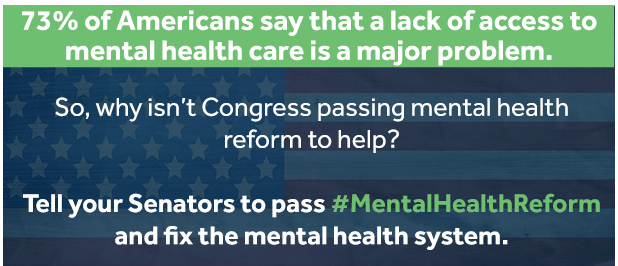
Illustration from NAMI Kenosha County
(11-18-16) Before the presidential election, Patrick Kennedy was urging Democrats in the Senate to delay passing the Mental Health Reform Act of 2016. so they could rework it once Hillary Clinton was president and the Democrats gained more control in Congress.
Oops.
Now that Donald Trump is president-elect and Republicans have won majorities, well, that strategy has been flipped on its head.
Some Democrats are now concerned it will be the Republicans who delay passing mental health reform so they can restore tougher language that was in House Republican Rep. Tim Murphy’s original Helping Families In Mental Health Crisis Act.
(For those of you who have lost track – Democrats blocked passage of Murphy’s bill until Rep. Fred Upton (R-MI) rewrote it earlier this year. It was further reworked in the Senate by Senator Lamar Alexander (R-Tenn.) who is shepherding it through the chamber with help from Sen. John Cornyn (R-Tx.), the powerful Senate Majority Whip. Kennedy complained that the bill has been so “waterdowned…it will do more harm than good.”)
Don’t worry about the Republicans trying to delay things, Sen. Cornyn assured reporters and officials from the National Alliance on Mental Illness this week.
He and Sen. Alexander still “hope” to get mental health reform passed during the lame duck session this month. They are saying “hope” because the latest strategy is to attach the mental health bill to another bill rather than introducing it as stand alone legislation. Both think that will improve its chances of passing.
Cornyn told NAMI and also Mary Ellen McIntire, a Capitol Hill reporter for Morning Consult, that mental health reform (Senate Bill 2680) may be combined with the 21st Century Cures Act, which Sen. Alexander has suggested could be “the most important legislation Congress passes this year.”
The House easily passed the 21st Century Cures Act about a year ago. “It includes more than $9 billion in mandatory funding for the National Institutes of Health over the next five years,”according to Healthcare writer Shannon Muchmore. “Those funds would support President Barack Obama’s precision medicine initiative and the administration’s “moonshot” effort to advance cancer research.”
Supporters say the bill will remove regulatory burdens at the Food and Drug Administration and would allow more breakthrough medications and medical devices to receive approval and get on the market faster. (Which is why the drug and medical device industries are strongly pushing the bill. After Rep. Upton drafted the act, OpenSecrets.org, named him as the top recipient of contributions from the pharma industry during 2013-14.) Opponents claim it will remove important safeguards that protect the public from drug companies rushing out medicines without credible evidence they are safe. (Click here and here to read comprehensive critiques of the bill.)
The biggest obstacle for passage of the bill is (what else?) a disagreement about funding for NIH.
Muchmore notes: “Democrats and Republicans in the Senate still do not agree on the mandatory NIH funding. Democrats argue that the agency needs a funding boost to make up for years of budget cuts or it will fall far behind in research. Many Republicans have said they would not support mandatory funding unless the NIH is also required to restructure its budget.”
A determined Senate Majority Leader Mitch McConnell (R-Ky.) has been quoted saying that passing the Cures Act is a priority during this month’s lame-duck session. In fact, a vote could come immediately after Thanksgiving.
If Sens. Cornyn and Alexander get the mental health legislation tacked on and Congress approves the Cures Act, the combined legislation would go to President Obama’s desk for signing before Trump takes office. Given that the Cures Act includes two of President Obama’s initiatives — precision medicine and Cancer Moonshot – everyone expects him to sign it.
Apparently both Republicans and Democrats are concerned about what might happen to both pieces of legislation if they are held over into a Trump Administration.
As of today, that’s the plan but hang on, given the twists and turns that have happened already to Murphy’s bill, no one can say for sure what may happen next.



